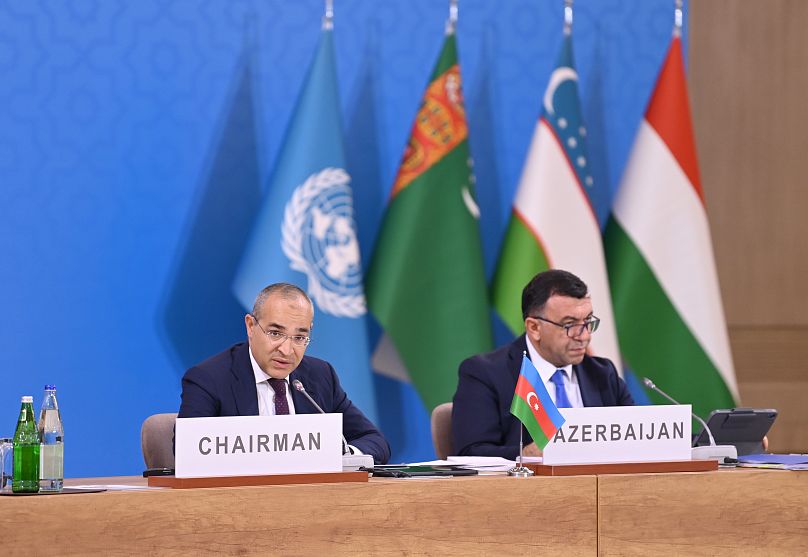Central Asian countries united last week to shine the spotlight on collaborative development, sustainability and regional integration as part of their continued economic expansion.
Speaking at the United Nations Special Programme for the Economies of Central Asia (SPECA) Governing Council meeting in Baku, Azerbaijan’s Minister of Economy Mikayil Jabbarov emphasised the Trans-Caspian International Transport Corridor’s (Middle Corridor) potential to revitalise economic ties among member countries and expand trade cooperation.
Established on March 26, 1998, SPECA program’s current members include Afghanistan, Azerbaijan, Kazakhstan, Kyrgyzstan, Tajikistan, Turkmenistan, and Uzbekistan.
The platform’s overall mission is to support the countries in their efforts for development, cooperation and integration into the economies of Europe and Asia, through several UN-backed initiatives and policies.
At the 2023 SPECA Economic Forum, participating countries reviewed national and regional plans and strategies for sustainable trade facilitation and development and strengthened cooperation among trade diplomats to be rolled out in the next two to three years.
Connectivity is key
The 18th meeting of the SPECA Governing Council was held under Azerbaijani chairmanship and focused on the theme of “Transforming the SPECA region into a connectivity hub with global outreach”.
For the first time in the organisation’s history, the SPECA summit was held at a head of state level, with prime ministers of Georgia and Hungary and the Secretary General of the Gulf Cooperation attending the discussions in Baku as guests of honour.
Participating members discussed the increasing significance of connectivity in the face of new challenges in the Middle Corridor between Europe and China, highlighting the potential of digital transformation to make economies greener, circular and inclusive.
In landlocked countries, businesses pay more than double their coastal counterparts to export their goods, with huge trade costs reducing demand and impeding sustainable development.
To address this, SPECA hopes to digitise the supply chain for more efficient Euro-Asian transport links in line with the UN’s legal standards, such as the UN/CEFAT standards for multimodal data exchange to facilitate goods across borders.
Sustainable energy at the forefront
The Working Group supports cross-border and regional cooperation for the implementation of the 2030 Sustainable Development Agenda in Central Asia to advance green and sustainable trade.
The regional energy system in Central Asia contains huge untapped potential, with SPECA participating states working to diversify energy transit routes and sources to global markets.
Infrastructure for large-scale energy generation is also crucial, with Azerbaijan and other participating states developing their capacity and enhancing regional energy connectivity to improve the resiliency of the system.
An integrated and interconnected energy infrastructure, which encompasses the electricity and gas grid and enables the transport and trade of low-carbon and green hydrogen, can help create a more reliable, affordable and sustainable energy supply.
This also allows for deep decarbonisation and increased integration of scaled renewable energy, which will generate new jobs, improve gender equality and work towards the sustainable development of the economy.
Building on past success
Experts from across the member states descended on Baku in a fruitful exchange of views through panel discussions, formulating new ideas and initiatives related to trade, transport, digitalisation and energy in the SPECA region.
The resulting conclusions will guide member states on how to transform the SPECA region into a well-connected and sustainable hub for trade and transport with global outreach in line with the Sustainable Development Goals (SDGs).
The final session of the forum featured insight from academic and research institutions who discussed long-term strategic foresight aimed at harnessing international integration for the next 25 years.
This year’s event builds on 25 years of progress, which has forged impactful integration within the region and positioned the SPECA region as a connectivity hub at the geographic heart of the Eurasian landmass.
In 2019, the SPECA Economic Forum issued the Ashgabat initiative on enhancing connectivity using UN norms, standards and tools whilst bolstering connectivity in the SPECA region.
The 2021 forum, meanwhile, prepared the Tashkent Statement on Sustainable Transport, Trade and Connectivity in the SPECA Region for a Greener, Circular and Inclusive Post-Pandemic Recovery.
In the declaration, members affirmed their intention to collaborate on building a greener, circular and inclusive economy in the region as it recovered from the COVID-19 pandemic, with a particular focus on trade, transport and connectivity.
Speaking at the SPECA summit, Azerbaijan’s President Ilham Aliyev explained how collaborative efforts have strengthened financial stability over the years.
“At the time of SPECA’s inception, the Member States were taking their first steps as independent countries. We were facing a multitude of problems and challenges” he said.
“In the last 25 years, we have overcome the major challenges, strengthened our state sovereignty, become valuable members of the international community and achieved rapid economic development. Another factor uniting our countries is the political stability.”
Kyrgyzstan’s Minister of Economy and Commerce Daniyar Amangeldiev echoed these views and spoke of the region’s potential moving forward.
"We are in a geopolitically unique location that provides tremendous prospects for the expansion of transit routes, trade, and economic growth. Central Asia holds a vital place in today's world,” he said.
“This region is more than just a crossroads of commerce lines; it is a site where the interests of various countries and regions intersect.”


